Professional Identity in Nursing
VerifiedAdded on 2023/06/12
|10
|2349
|309
AI Summary
This essay discusses the professional identity of a nurse and the factors that play a role in governing or modifying the professional identity, thereby affecting their job. It also highlights the importance of professional standards and regulations in maintaining the standards for all individuals within the nursing profession.
Contribute Materials
Your contribution can guide someone’s learning journey. Share your
documents today.
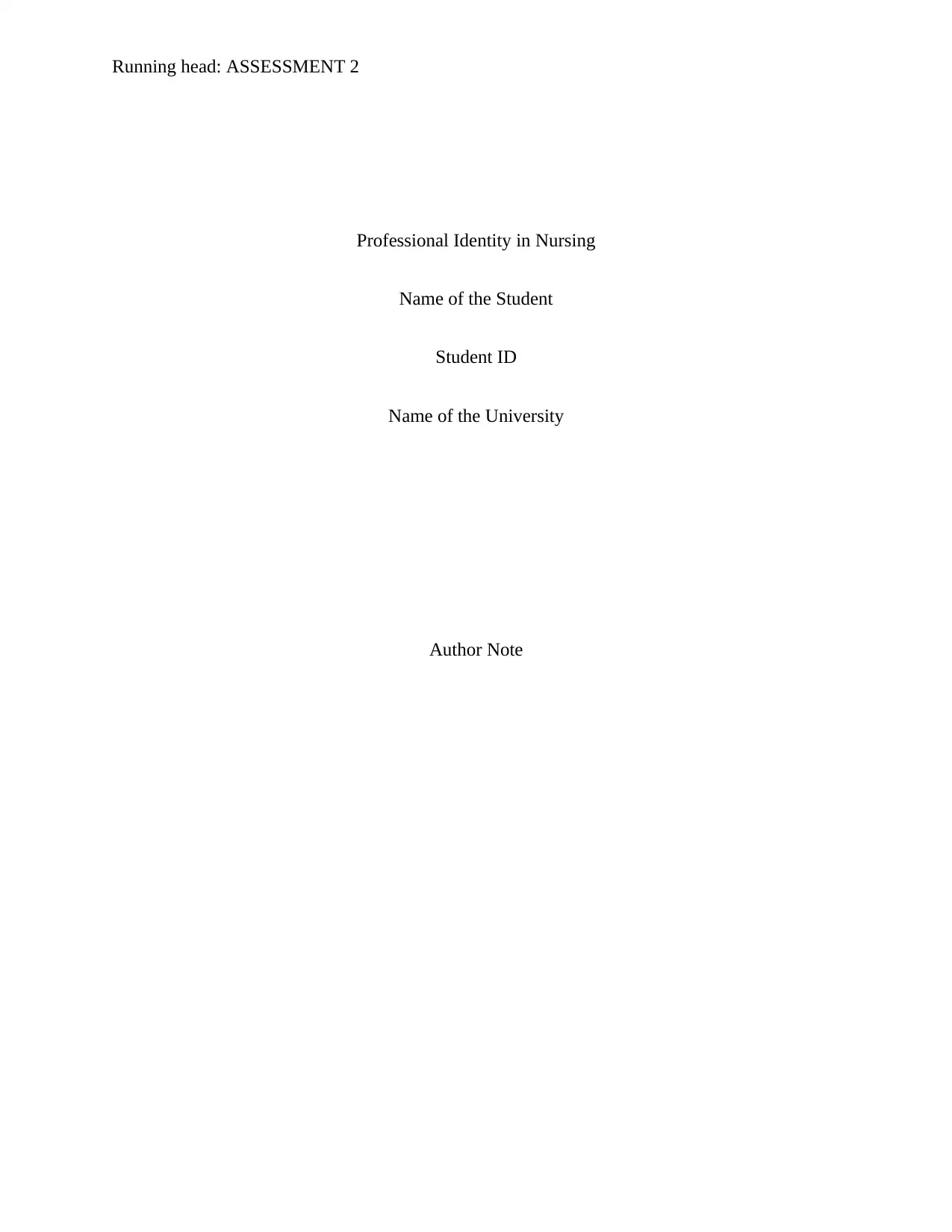
Running head: ASSESSMENT 2
Professional Identity in Nursing
Name of the Student
Student ID
Name of the University
Author Note
Professional Identity in Nursing
Name of the Student
Student ID
Name of the University
Author Note
Secure Best Marks with AI Grader
Need help grading? Try our AI Grader for instant feedback on your assignments.
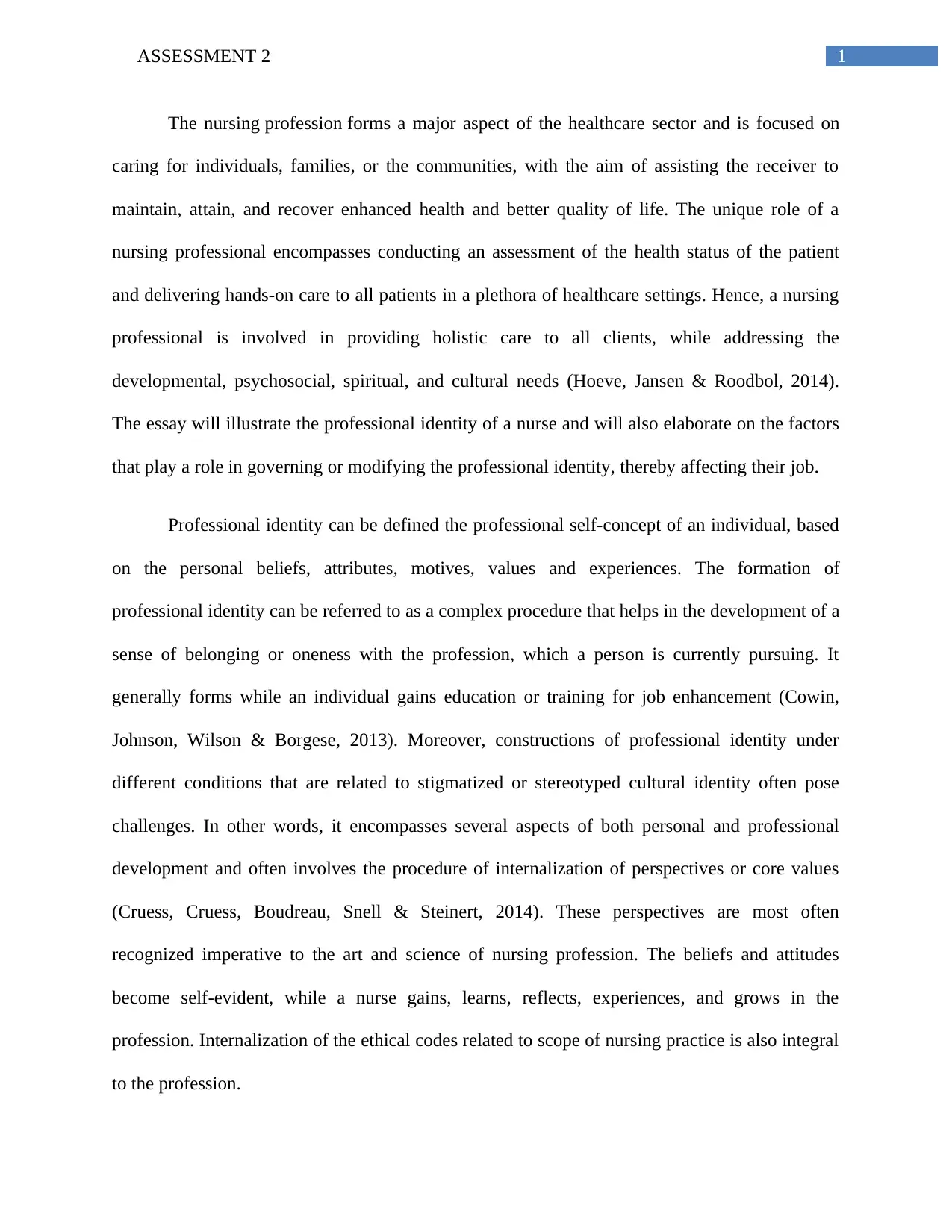
1ASSESSMENT 2
The nursing profession forms a major aspect of the healthcare sector and is focused on
caring for individuals, families, or the communities, with the aim of assisting the receiver to
maintain, attain, and recover enhanced health and better quality of life. The unique role of a
nursing professional encompasses conducting an assessment of the health status of the patient
and delivering hands-on care to all patients in a plethora of healthcare settings. Hence, a nursing
professional is involved in providing holistic care to all clients, while addressing the
developmental, psychosocial, spiritual, and cultural needs (Hoeve, Jansen & Roodbol, 2014).
The essay will illustrate the professional identity of a nurse and will also elaborate on the factors
that play a role in governing or modifying the professional identity, thereby affecting their job.
Professional identity can be defined the professional self-concept of an individual, based
on the personal beliefs, attributes, motives, values and experiences. The formation of
professional identity can be referred to as a complex procedure that helps in the development of a
sense of belonging or oneness with the profession, which a person is currently pursuing. It
generally forms while an individual gains education or training for job enhancement (Cowin,
Johnson, Wilson & Borgese, 2013). Moreover, constructions of professional identity under
different conditions that are related to stigmatized or stereotyped cultural identity often pose
challenges. In other words, it encompasses several aspects of both personal and professional
development and often involves the procedure of internalization of perspectives or core values
(Cruess, Cruess, Boudreau, Snell & Steinert, 2014). These perspectives are most often
recognized imperative to the art and science of nursing profession. The beliefs and attitudes
become self-evident, while a nurse gains, learns, reflects, experiences, and grows in the
profession. Internalization of the ethical codes related to scope of nursing practice is also integral
to the profession.
The nursing profession forms a major aspect of the healthcare sector and is focused on
caring for individuals, families, or the communities, with the aim of assisting the receiver to
maintain, attain, and recover enhanced health and better quality of life. The unique role of a
nursing professional encompasses conducting an assessment of the health status of the patient
and delivering hands-on care to all patients in a plethora of healthcare settings. Hence, a nursing
professional is involved in providing holistic care to all clients, while addressing the
developmental, psychosocial, spiritual, and cultural needs (Hoeve, Jansen & Roodbol, 2014).
The essay will illustrate the professional identity of a nurse and will also elaborate on the factors
that play a role in governing or modifying the professional identity, thereby affecting their job.
Professional identity can be defined the professional self-concept of an individual, based
on the personal beliefs, attributes, motives, values and experiences. The formation of
professional identity can be referred to as a complex procedure that helps in the development of a
sense of belonging or oneness with the profession, which a person is currently pursuing. It
generally forms while an individual gains education or training for job enhancement (Cowin,
Johnson, Wilson & Borgese, 2013). Moreover, constructions of professional identity under
different conditions that are related to stigmatized or stereotyped cultural identity often pose
challenges. In other words, it encompasses several aspects of both personal and professional
development and often involves the procedure of internalization of perspectives or core values
(Cruess, Cruess, Boudreau, Snell & Steinert, 2014). These perspectives are most often
recognized imperative to the art and science of nursing profession. The beliefs and attitudes
become self-evident, while a nurse gains, learns, reflects, experiences, and grows in the
profession. Internalization of the ethical codes related to scope of nursing practice is also integral
to the profession.
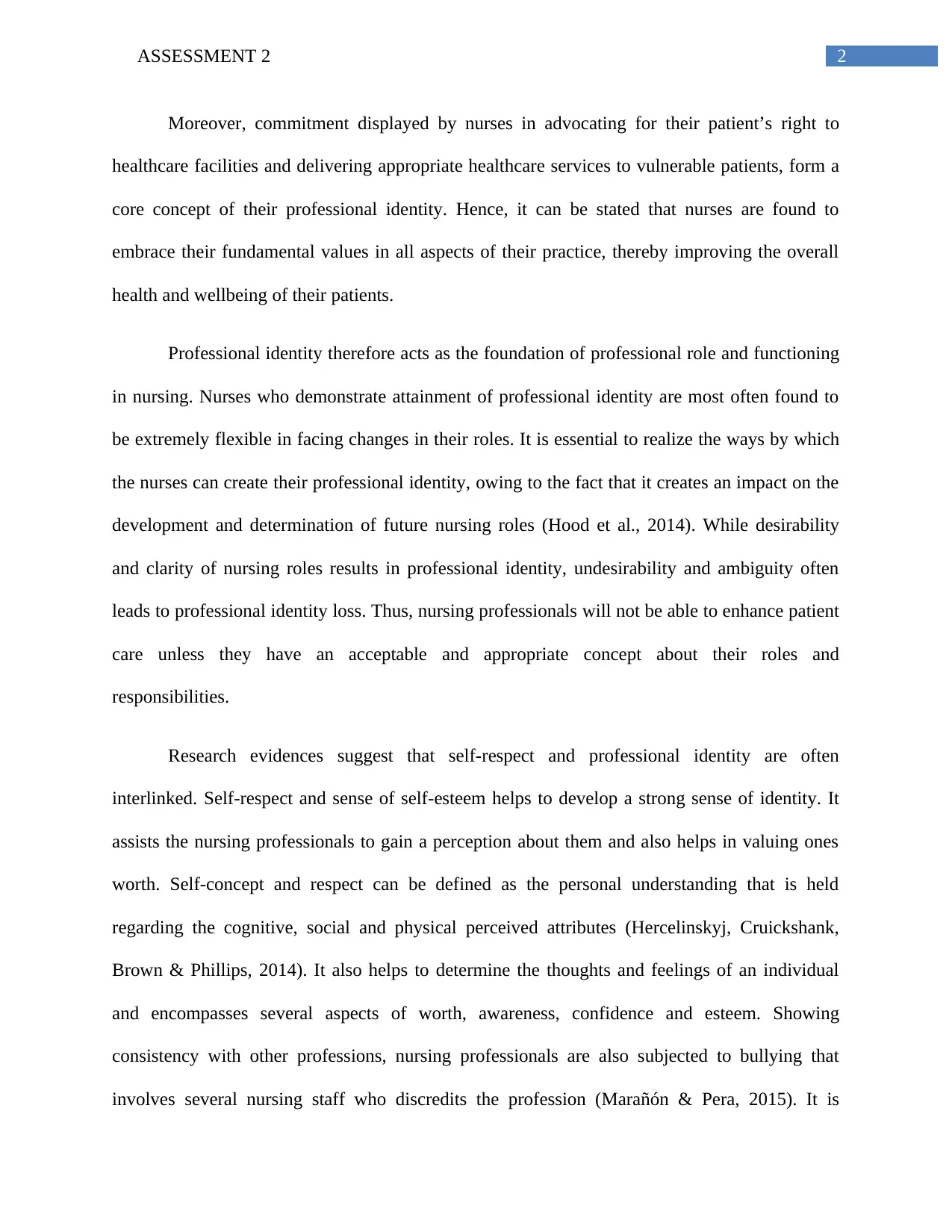
2ASSESSMENT 2
Moreover, commitment displayed by nurses in advocating for their patient’s right to
healthcare facilities and delivering appropriate healthcare services to vulnerable patients, form a
core concept of their professional identity. Hence, it can be stated that nurses are found to
embrace their fundamental values in all aspects of their practice, thereby improving the overall
health and wellbeing of their patients.
Professional identity therefore acts as the foundation of professional role and functioning
in nursing. Nurses who demonstrate attainment of professional identity are most often found to
be extremely flexible in facing changes in their roles. It is essential to realize the ways by which
the nurses can create their professional identity, owing to the fact that it creates an impact on the
development and determination of future nursing roles (Hood et al., 2014). While desirability
and clarity of nursing roles results in professional identity, undesirability and ambiguity often
leads to professional identity loss. Thus, nursing professionals will not be able to enhance patient
care unless they have an acceptable and appropriate concept about their roles and
responsibilities.
Research evidences suggest that self-respect and professional identity are often
interlinked. Self-respect and sense of self-esteem helps to develop a strong sense of identity. It
assists the nursing professionals to gain a perception about them and also helps in valuing ones
worth. Self-concept and respect can be defined as the personal understanding that is held
regarding the cognitive, social and physical perceived attributes (Hercelinskyj, Cruickshank,
Brown & Phillips, 2014). It also helps to determine the thoughts and feelings of an individual
and encompasses several aspects of worth, awareness, confidence and esteem. Showing
consistency with other professions, nursing professionals are also subjected to bullying that
involves several nursing staff who discredits the profession (Marañón & Pera, 2015). It is
Moreover, commitment displayed by nurses in advocating for their patient’s right to
healthcare facilities and delivering appropriate healthcare services to vulnerable patients, form a
core concept of their professional identity. Hence, it can be stated that nurses are found to
embrace their fundamental values in all aspects of their practice, thereby improving the overall
health and wellbeing of their patients.
Professional identity therefore acts as the foundation of professional role and functioning
in nursing. Nurses who demonstrate attainment of professional identity are most often found to
be extremely flexible in facing changes in their roles. It is essential to realize the ways by which
the nurses can create their professional identity, owing to the fact that it creates an impact on the
development and determination of future nursing roles (Hood et al., 2014). While desirability
and clarity of nursing roles results in professional identity, undesirability and ambiguity often
leads to professional identity loss. Thus, nursing professionals will not be able to enhance patient
care unless they have an acceptable and appropriate concept about their roles and
responsibilities.
Research evidences suggest that self-respect and professional identity are often
interlinked. Self-respect and sense of self-esteem helps to develop a strong sense of identity. It
assists the nursing professionals to gain a perception about them and also helps in valuing ones
worth. Self-concept and respect can be defined as the personal understanding that is held
regarding the cognitive, social and physical perceived attributes (Hercelinskyj, Cruickshank,
Brown & Phillips, 2014). It also helps to determine the thoughts and feelings of an individual
and encompasses several aspects of worth, awareness, confidence and esteem. Showing
consistency with other professions, nursing professionals are also subjected to bullying that
involves several nursing staff who discredits the profession (Marañón & Pera, 2015). It is
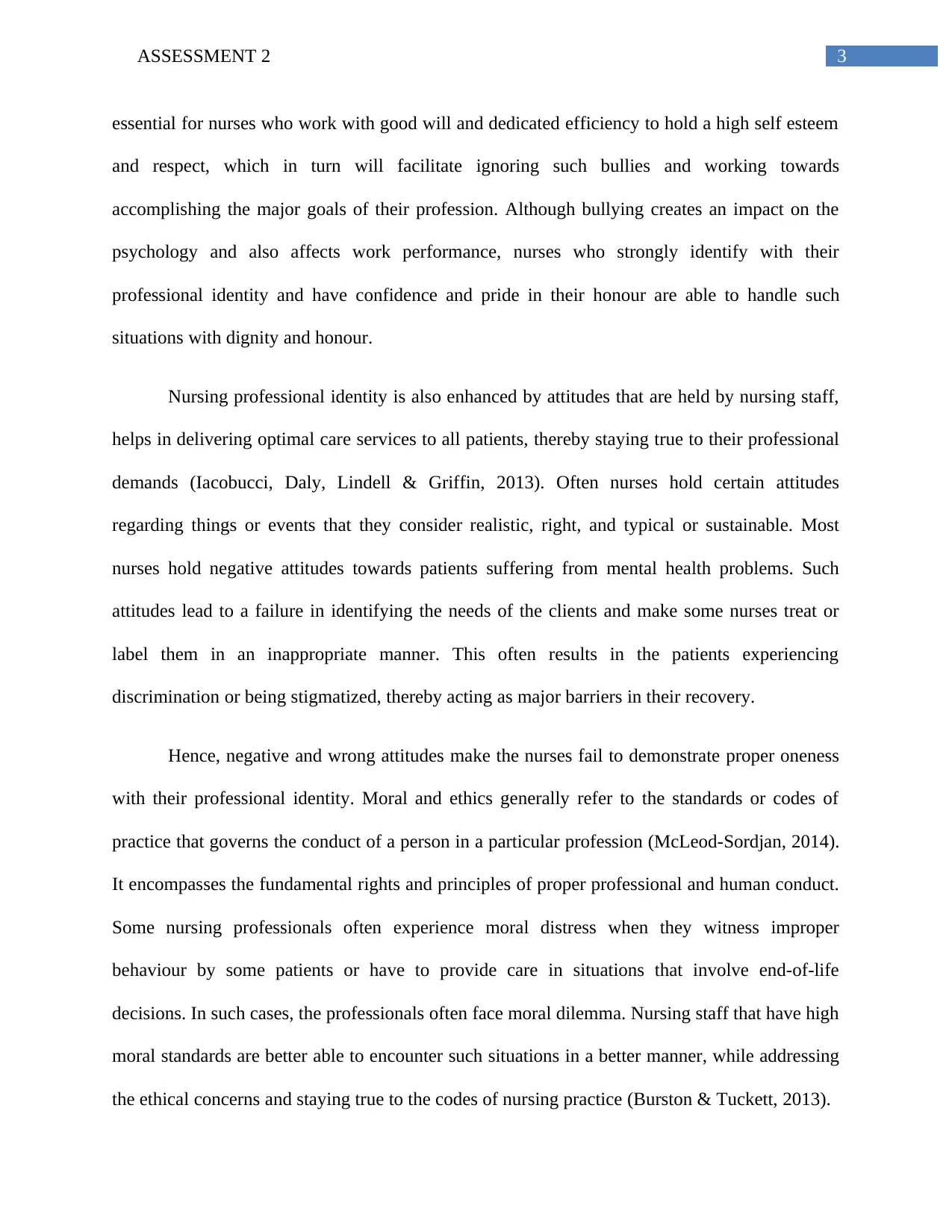
3ASSESSMENT 2
essential for nurses who work with good will and dedicated efficiency to hold a high self esteem
and respect, which in turn will facilitate ignoring such bullies and working towards
accomplishing the major goals of their profession. Although bullying creates an impact on the
psychology and also affects work performance, nurses who strongly identify with their
professional identity and have confidence and pride in their honour are able to handle such
situations with dignity and honour.
Nursing professional identity is also enhanced by attitudes that are held by nursing staff,
helps in delivering optimal care services to all patients, thereby staying true to their professional
demands (Iacobucci, Daly, Lindell & Griffin, 2013). Often nurses hold certain attitudes
regarding things or events that they consider realistic, right, and typical or sustainable. Most
nurses hold negative attitudes towards patients suffering from mental health problems. Such
attitudes lead to a failure in identifying the needs of the clients and make some nurses treat or
label them in an inappropriate manner. This often results in the patients experiencing
discrimination or being stigmatized, thereby acting as major barriers in their recovery.
Hence, negative and wrong attitudes make the nurses fail to demonstrate proper oneness
with their professional identity. Moral and ethics generally refer to the standards or codes of
practice that governs the conduct of a person in a particular profession (McLeod-Sordjan, 2014).
It encompasses the fundamental rights and principles of proper professional and human conduct.
Some nursing professionals often experience moral distress when they witness improper
behaviour by some patients or have to provide care in situations that involve end-of-life
decisions. In such cases, the professionals often face moral dilemma. Nursing staff that have high
moral standards are better able to encounter such situations in a better manner, while addressing
the ethical concerns and staying true to the codes of nursing practice (Burston & Tuckett, 2013).
essential for nurses who work with good will and dedicated efficiency to hold a high self esteem
and respect, which in turn will facilitate ignoring such bullies and working towards
accomplishing the major goals of their profession. Although bullying creates an impact on the
psychology and also affects work performance, nurses who strongly identify with their
professional identity and have confidence and pride in their honour are able to handle such
situations with dignity and honour.
Nursing professional identity is also enhanced by attitudes that are held by nursing staff,
helps in delivering optimal care services to all patients, thereby staying true to their professional
demands (Iacobucci, Daly, Lindell & Griffin, 2013). Often nurses hold certain attitudes
regarding things or events that they consider realistic, right, and typical or sustainable. Most
nurses hold negative attitudes towards patients suffering from mental health problems. Such
attitudes lead to a failure in identifying the needs of the clients and make some nurses treat or
label them in an inappropriate manner. This often results in the patients experiencing
discrimination or being stigmatized, thereby acting as major barriers in their recovery.
Hence, negative and wrong attitudes make the nurses fail to demonstrate proper oneness
with their professional identity. Moral and ethics generally refer to the standards or codes of
practice that governs the conduct of a person in a particular profession (McLeod-Sordjan, 2014).
It encompasses the fundamental rights and principles of proper professional and human conduct.
Some nursing professionals often experience moral distress when they witness improper
behaviour by some patients or have to provide care in situations that involve end-of-life
decisions. In such cases, the professionals often face moral dilemma. Nursing staff that have high
moral standards are better able to encounter such situations in a better manner, while addressing
the ethical concerns and staying true to the codes of nursing practice (Burston & Tuckett, 2013).
Secure Best Marks with AI Grader
Need help grading? Try our AI Grader for instant feedback on your assignments.
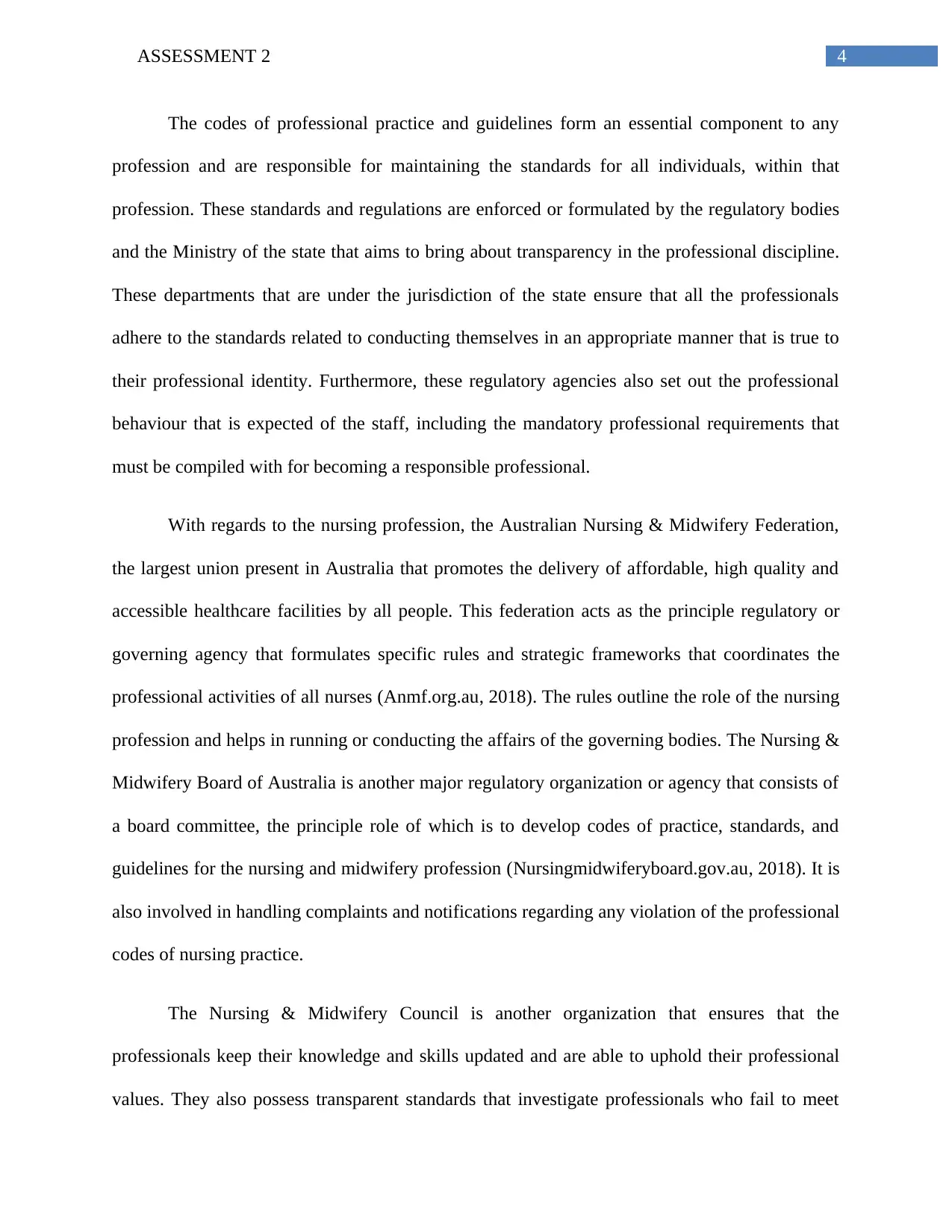
4ASSESSMENT 2
The codes of professional practice and guidelines form an essential component to any
profession and are responsible for maintaining the standards for all individuals, within that
profession. These standards and regulations are enforced or formulated by the regulatory bodies
and the Ministry of the state that aims to bring about transparency in the professional discipline.
These departments that are under the jurisdiction of the state ensure that all the professionals
adhere to the standards related to conducting themselves in an appropriate manner that is true to
their professional identity. Furthermore, these regulatory agencies also set out the professional
behaviour that is expected of the staff, including the mandatory professional requirements that
must be compiled with for becoming a responsible professional.
With regards to the nursing profession, the Australian Nursing & Midwifery Federation,
the largest union present in Australia that promotes the delivery of affordable, high quality and
accessible healthcare facilities by all people. This federation acts as the principle regulatory or
governing agency that formulates specific rules and strategic frameworks that coordinates the
professional activities of all nurses (Anmf.org.au, 2018). The rules outline the role of the nursing
profession and helps in running or conducting the affairs of the governing bodies. The Nursing &
Midwifery Board of Australia is another major regulatory organization or agency that consists of
a board committee, the principle role of which is to develop codes of practice, standards, and
guidelines for the nursing and midwifery profession (Nursingmidwiferyboard.gov.au, 2018). It is
also involved in handling complaints and notifications regarding any violation of the professional
codes of nursing practice.
The Nursing & Midwifery Council is another organization that ensures that the
professionals keep their knowledge and skills updated and are able to uphold their professional
values. They also possess transparent standards that investigate professionals who fail to meet
The codes of professional practice and guidelines form an essential component to any
profession and are responsible for maintaining the standards for all individuals, within that
profession. These standards and regulations are enforced or formulated by the regulatory bodies
and the Ministry of the state that aims to bring about transparency in the professional discipline.
These departments that are under the jurisdiction of the state ensure that all the professionals
adhere to the standards related to conducting themselves in an appropriate manner that is true to
their professional identity. Furthermore, these regulatory agencies also set out the professional
behaviour that is expected of the staff, including the mandatory professional requirements that
must be compiled with for becoming a responsible professional.
With regards to the nursing profession, the Australian Nursing & Midwifery Federation,
the largest union present in Australia that promotes the delivery of affordable, high quality and
accessible healthcare facilities by all people. This federation acts as the principle regulatory or
governing agency that formulates specific rules and strategic frameworks that coordinates the
professional activities of all nurses (Anmf.org.au, 2018). The rules outline the role of the nursing
profession and helps in running or conducting the affairs of the governing bodies. The Nursing &
Midwifery Board of Australia is another major regulatory organization or agency that consists of
a board committee, the principle role of which is to develop codes of practice, standards, and
guidelines for the nursing and midwifery profession (Nursingmidwiferyboard.gov.au, 2018). It is
also involved in handling complaints and notifications regarding any violation of the professional
codes of nursing practice.
The Nursing & Midwifery Council is another organization that ensures that the
professionals keep their knowledge and skills updated and are able to uphold their professional
values. They also possess transparent standards that investigate professionals who fail to meet
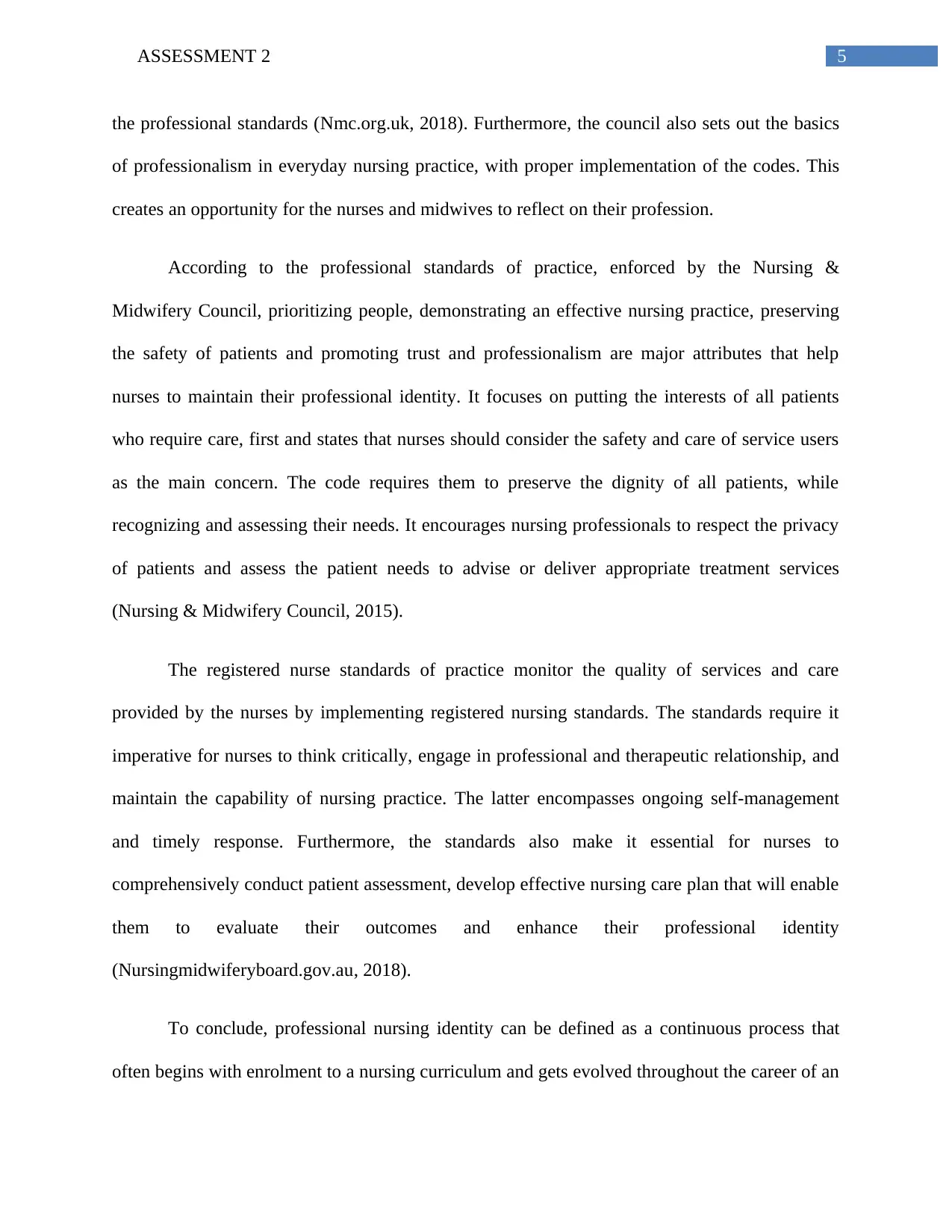
5ASSESSMENT 2
the professional standards (Nmc.org.uk, 2018). Furthermore, the council also sets out the basics
of professionalism in everyday nursing practice, with proper implementation of the codes. This
creates an opportunity for the nurses and midwives to reflect on their profession.
According to the professional standards of practice, enforced by the Nursing &
Midwifery Council, prioritizing people, demonstrating an effective nursing practice, preserving
the safety of patients and promoting trust and professionalism are major attributes that help
nurses to maintain their professional identity. It focuses on putting the interests of all patients
who require care, first and states that nurses should consider the safety and care of service users
as the main concern. The code requires them to preserve the dignity of all patients, while
recognizing and assessing their needs. It encourages nursing professionals to respect the privacy
of patients and assess the patient needs to advise or deliver appropriate treatment services
(Nursing & Midwifery Council, 2015).
The registered nurse standards of practice monitor the quality of services and care
provided by the nurses by implementing registered nursing standards. The standards require it
imperative for nurses to think critically, engage in professional and therapeutic relationship, and
maintain the capability of nursing practice. The latter encompasses ongoing self-management
and timely response. Furthermore, the standards also make it essential for nurses to
comprehensively conduct patient assessment, develop effective nursing care plan that will enable
them to evaluate their outcomes and enhance their professional identity
(Nursingmidwiferyboard.gov.au, 2018).
To conclude, professional nursing identity can be defined as a continuous process that
often begins with enrolment to a nursing curriculum and gets evolved throughout the career of an
the professional standards (Nmc.org.uk, 2018). Furthermore, the council also sets out the basics
of professionalism in everyday nursing practice, with proper implementation of the codes. This
creates an opportunity for the nurses and midwives to reflect on their profession.
According to the professional standards of practice, enforced by the Nursing &
Midwifery Council, prioritizing people, demonstrating an effective nursing practice, preserving
the safety of patients and promoting trust and professionalism are major attributes that help
nurses to maintain their professional identity. It focuses on putting the interests of all patients
who require care, first and states that nurses should consider the safety and care of service users
as the main concern. The code requires them to preserve the dignity of all patients, while
recognizing and assessing their needs. It encourages nursing professionals to respect the privacy
of patients and assess the patient needs to advise or deliver appropriate treatment services
(Nursing & Midwifery Council, 2015).
The registered nurse standards of practice monitor the quality of services and care
provided by the nurses by implementing registered nursing standards. The standards require it
imperative for nurses to think critically, engage in professional and therapeutic relationship, and
maintain the capability of nursing practice. The latter encompasses ongoing self-management
and timely response. Furthermore, the standards also make it essential for nurses to
comprehensively conduct patient assessment, develop effective nursing care plan that will enable
them to evaluate their outcomes and enhance their professional identity
(Nursingmidwiferyboard.gov.au, 2018).
To conclude, professional nursing identity can be defined as a continuous process that
often begins with enrolment to a nursing curriculum and gets evolved throughout the career of an
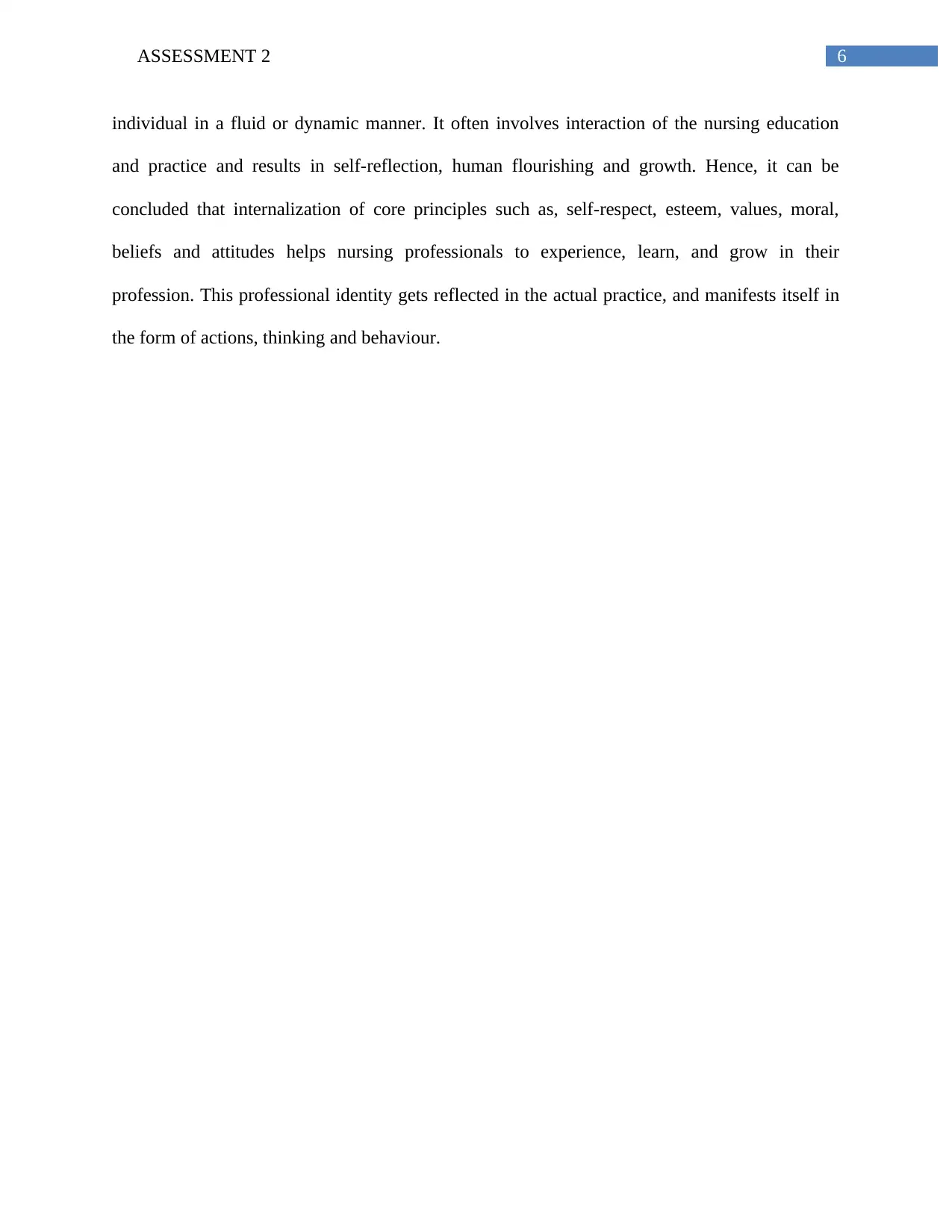
6ASSESSMENT 2
individual in a fluid or dynamic manner. It often involves interaction of the nursing education
and practice and results in self-reflection, human flourishing and growth. Hence, it can be
concluded that internalization of core principles such as, self-respect, esteem, values, moral,
beliefs and attitudes helps nursing professionals to experience, learn, and grow in their
profession. This professional identity gets reflected in the actual practice, and manifests itself in
the form of actions, thinking and behaviour.
individual in a fluid or dynamic manner. It often involves interaction of the nursing education
and practice and results in self-reflection, human flourishing and growth. Hence, it can be
concluded that internalization of core principles such as, self-respect, esteem, values, moral,
beliefs and attitudes helps nursing professionals to experience, learn, and grow in their
profession. This professional identity gets reflected in the actual practice, and manifests itself in
the form of actions, thinking and behaviour.
Paraphrase This Document
Need a fresh take? Get an instant paraphrase of this document with our AI Paraphraser
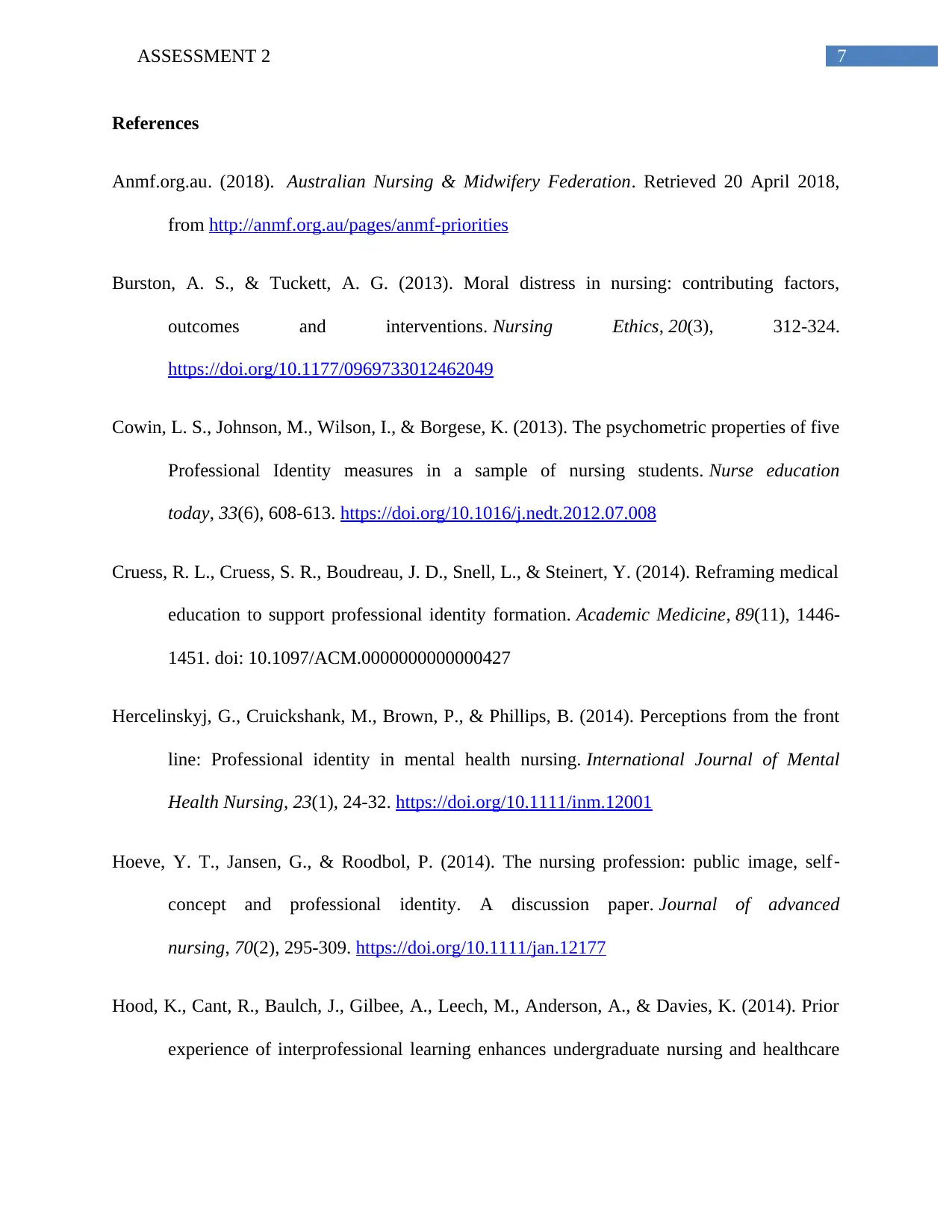
7ASSESSMENT 2
References
Anmf.org.au. (2018). Australian Nursing & Midwifery Federation. Retrieved 20 April 2018,
from http://anmf.org.au/pages/anmf-priorities
Burston, A. S., & Tuckett, A. G. (2013). Moral distress in nursing: contributing factors,
outcomes and interventions. Nursing Ethics, 20(3), 312-324.
https://doi.org/10.1177/0969733012462049
Cowin, L. S., Johnson, M., Wilson, I., & Borgese, K. (2013). The psychometric properties of five
Professional Identity measures in a sample of nursing students. Nurse education
today, 33(6), 608-613. https://doi.org/10.1016/j.nedt.2012.07.008
Cruess, R. L., Cruess, S. R., Boudreau, J. D., Snell, L., & Steinert, Y. (2014). Reframing medical
education to support professional identity formation. Academic Medicine, 89(11), 1446-
1451. doi: 10.1097/ACM.0000000000000427
Hercelinskyj, G., Cruickshank, M., Brown, P., & Phillips, B. (2014). Perceptions from the front
line: Professional identity in mental health nursing. International Journal of Mental
Health Nursing, 23(1), 24-32. https://doi.org/10.1111/inm.12001
Hoeve, Y. T., Jansen, G., & Roodbol, P. (2014). The nursing profession: public image, self‐
concept and professional identity. A discussion paper. Journal of advanced
nursing, 70(2), 295-309. https://doi.org/10.1111/jan.12177
Hood, K., Cant, R., Baulch, J., Gilbee, A., Leech, M., Anderson, A., & Davies, K. (2014). Prior
experience of interprofessional learning enhances undergraduate nursing and healthcare
References
Anmf.org.au. (2018). Australian Nursing & Midwifery Federation. Retrieved 20 April 2018,
from http://anmf.org.au/pages/anmf-priorities
Burston, A. S., & Tuckett, A. G. (2013). Moral distress in nursing: contributing factors,
outcomes and interventions. Nursing Ethics, 20(3), 312-324.
https://doi.org/10.1177/0969733012462049
Cowin, L. S., Johnson, M., Wilson, I., & Borgese, K. (2013). The psychometric properties of five
Professional Identity measures in a sample of nursing students. Nurse education
today, 33(6), 608-613. https://doi.org/10.1016/j.nedt.2012.07.008
Cruess, R. L., Cruess, S. R., Boudreau, J. D., Snell, L., & Steinert, Y. (2014). Reframing medical
education to support professional identity formation. Academic Medicine, 89(11), 1446-
1451. doi: 10.1097/ACM.0000000000000427
Hercelinskyj, G., Cruickshank, M., Brown, P., & Phillips, B. (2014). Perceptions from the front
line: Professional identity in mental health nursing. International Journal of Mental
Health Nursing, 23(1), 24-32. https://doi.org/10.1111/inm.12001
Hoeve, Y. T., Jansen, G., & Roodbol, P. (2014). The nursing profession: public image, self‐
concept and professional identity. A discussion paper. Journal of advanced
nursing, 70(2), 295-309. https://doi.org/10.1111/jan.12177
Hood, K., Cant, R., Baulch, J., Gilbee, A., Leech, M., Anderson, A., & Davies, K. (2014). Prior
experience of interprofessional learning enhances undergraduate nursing and healthcare
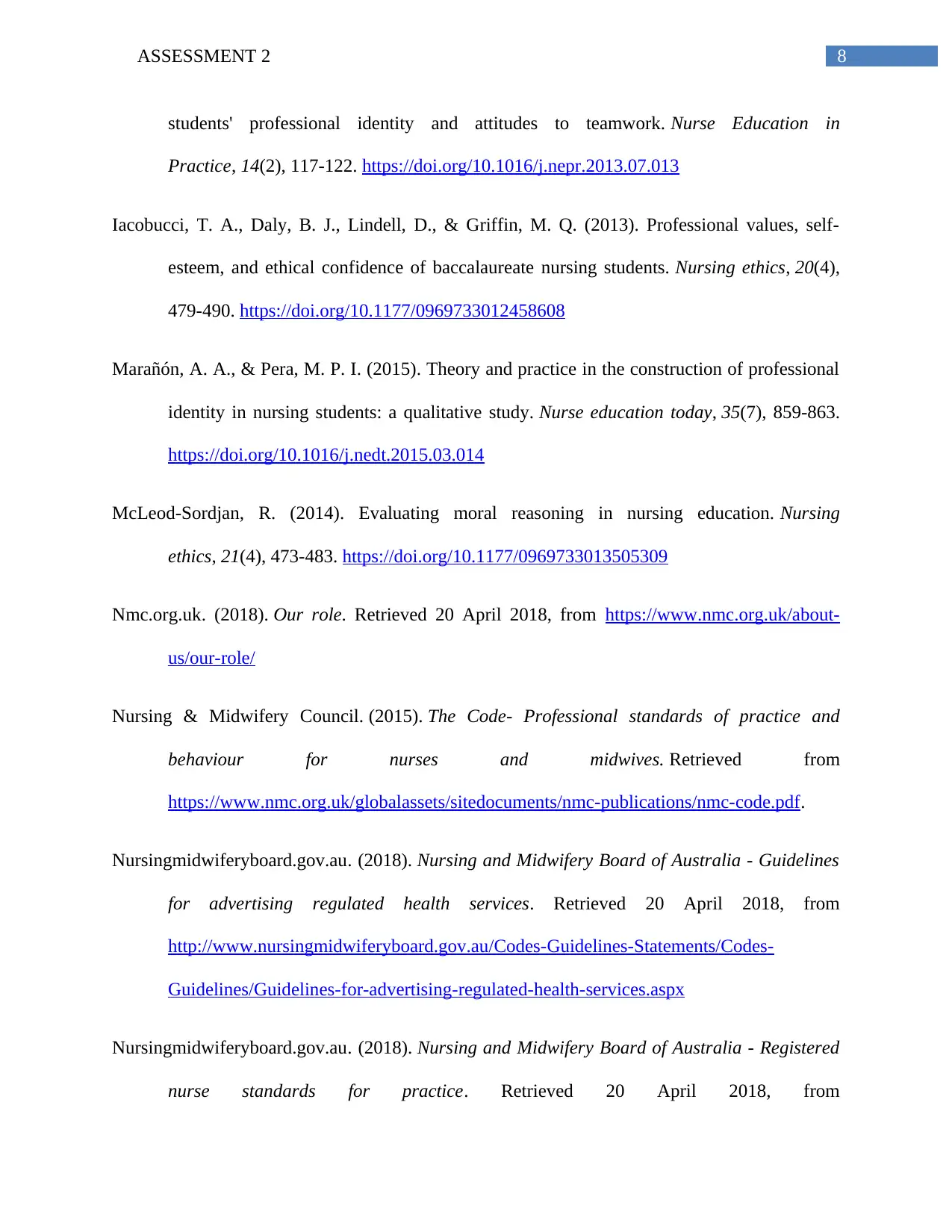
8ASSESSMENT 2
students' professional identity and attitudes to teamwork. Nurse Education in
Practice, 14(2), 117-122. https://doi.org/10.1016/j.nepr.2013.07.013
Iacobucci, T. A., Daly, B. J., Lindell, D., & Griffin, M. Q. (2013). Professional values, self-
esteem, and ethical confidence of baccalaureate nursing students. Nursing ethics, 20(4),
479-490. https://doi.org/10.1177/0969733012458608
Marañón, A. A., & Pera, M. P. I. (2015). Theory and practice in the construction of professional
identity in nursing students: a qualitative study. Nurse education today, 35(7), 859-863.
https://doi.org/10.1016/j.nedt.2015.03.014
McLeod-Sordjan, R. (2014). Evaluating moral reasoning in nursing education. Nursing
ethics, 21(4), 473-483. https://doi.org/10.1177/0969733013505309
Nmc.org.uk. (2018). Our role. Retrieved 20 April 2018, from https://www.nmc.org.uk/about-
us/our-role/
Nursing & Midwifery Council. (2015). The Code- Professional standards of practice and
behaviour for nurses and midwives. Retrieved from
https://www.nmc.org.uk/globalassets/sitedocuments/nmc-publications/nmc-code.pdf.
Nursingmidwiferyboard.gov.au. (2018). Nursing and Midwifery Board of Australia - Guidelines
for advertising regulated health services. Retrieved 20 April 2018, from
http://www.nursingmidwiferyboard.gov.au/Codes-Guidelines-Statements/Codes-
Guidelines/Guidelines-for-advertising-regulated-health-services.aspx
Nursingmidwiferyboard.gov.au. (2018). Nursing and Midwifery Board of Australia - Registered
nurse standards for practice. Retrieved 20 April 2018, from
students' professional identity and attitudes to teamwork. Nurse Education in
Practice, 14(2), 117-122. https://doi.org/10.1016/j.nepr.2013.07.013
Iacobucci, T. A., Daly, B. J., Lindell, D., & Griffin, M. Q. (2013). Professional values, self-
esteem, and ethical confidence of baccalaureate nursing students. Nursing ethics, 20(4),
479-490. https://doi.org/10.1177/0969733012458608
Marañón, A. A., & Pera, M. P. I. (2015). Theory and practice in the construction of professional
identity in nursing students: a qualitative study. Nurse education today, 35(7), 859-863.
https://doi.org/10.1016/j.nedt.2015.03.014
McLeod-Sordjan, R. (2014). Evaluating moral reasoning in nursing education. Nursing
ethics, 21(4), 473-483. https://doi.org/10.1177/0969733013505309
Nmc.org.uk. (2018). Our role. Retrieved 20 April 2018, from https://www.nmc.org.uk/about-
us/our-role/
Nursing & Midwifery Council. (2015). The Code- Professional standards of practice and
behaviour for nurses and midwives. Retrieved from
https://www.nmc.org.uk/globalassets/sitedocuments/nmc-publications/nmc-code.pdf.
Nursingmidwiferyboard.gov.au. (2018). Nursing and Midwifery Board of Australia - Guidelines
for advertising regulated health services. Retrieved 20 April 2018, from
http://www.nursingmidwiferyboard.gov.au/Codes-Guidelines-Statements/Codes-
Guidelines/Guidelines-for-advertising-regulated-health-services.aspx
Nursingmidwiferyboard.gov.au. (2018). Nursing and Midwifery Board of Australia - Registered
nurse standards for practice. Retrieved 20 April 2018, from

9ASSESSMENT 2
http://www.nursingmidwiferyboard.gov.au/Codes-Guidelines-Statements/Professional-
standards/registered-nurse-standards-for-practice.aspx
http://www.nursingmidwiferyboard.gov.au/Codes-Guidelines-Statements/Professional-
standards/registered-nurse-standards-for-practice.aspx
1 out of 10
Related Documents
Your All-in-One AI-Powered Toolkit for Academic Success.
+13062052269
info@desklib.com
Available 24*7 on WhatsApp / Email
![[object Object]](/_next/static/media/star-bottom.7253800d.svg)
Unlock your academic potential
© 2024 | Zucol Services PVT LTD | All rights reserved.





